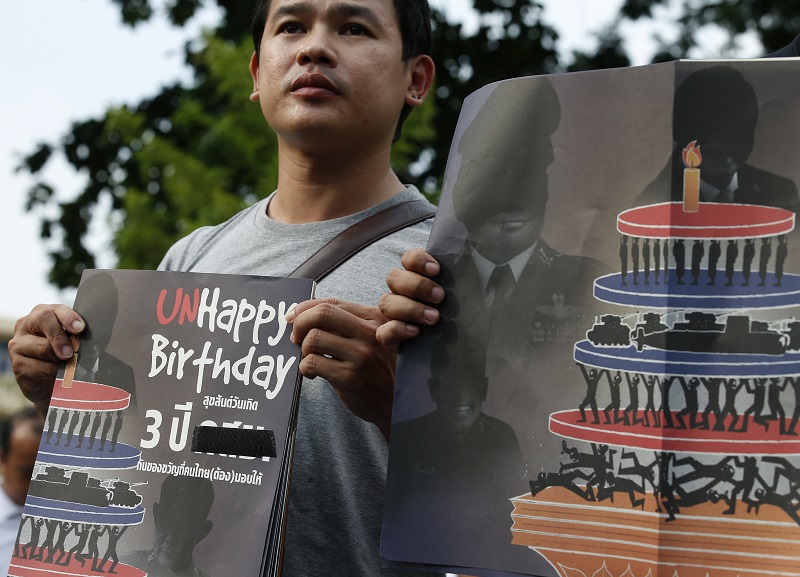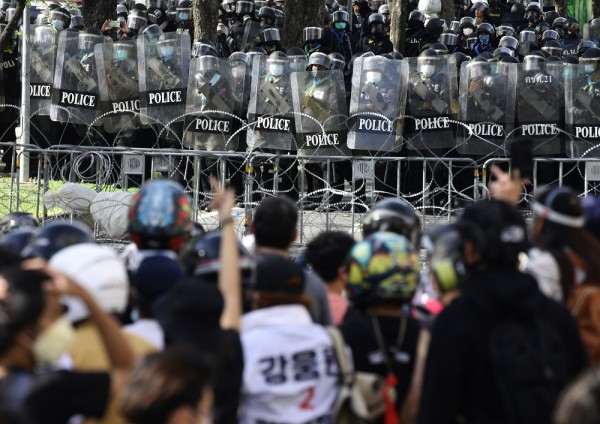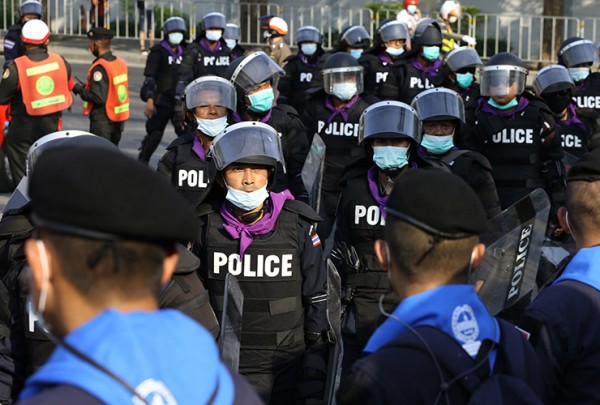The Thai military government’s continued enforcement of strict media laws and restrictions to target critics and independent reporting, and legislative efforts to take greater control over media, are leaving journalists in Thailand with an increasingly narrow space for free expression.
Journalists facing arrest and prosecution under the country’s lese-majeste, computer crimes and sedition laws already work in a climate of growing self-censorship and uncertainty. But proposed legislation on cybersecurity and media regulation has raised concerns about continuing government efforts to grant itself more control over all forms of media amid a crackdown on critical voices.
Recent targets of the crackdown include Pravit Rojanaphruk, a senior staff writer for Khaosod English. He faces up to 14 years in prison after being charged with sedition and computer-related crimes in August. Another target is human rights defender Jatupat Boonpattararaksa. In August, he was sentenced to two-and-a-half years in prison for violating the lese-majeste law protecting the country’s royal family from insult by sharing a BBC profile on Thailand’s king on social media.
Rojanaphruk, who currently is charged over seven Facebook posts critical of the junta, was forced to leave his previous post at The Nation newspaper after he was detained for a second time in a government “attitude adjustment” camp in 2015. The following year, authorities barred the journalist from attending UNESCO’s 2016 World Press Freedom Day conference in Finland.
Nevertheless, Rojanaphruk has remained an ardent critic of the ruling National Council on Peace and Order (NCPO), which seized power in 2014, both in social media and in his articles.
Targeted for Criticism
Edgardo Legaspi, director of the Southeast Asian Press Alliance (SEAPA), told IPI that he believes both Rojanaphruk and Boonpattararaksa were specifically targeted because they had kept up their criticism of the regime.
“Thailand is getting more dangerous for persons that continue to criticize the government, as well as media platforms that provide independent and critical reports,” Legaspi told IPI. In addition to traditional and broadcast media, online news platforms like Khaosod English, BBC Thailand and Prachatai “have been targets or linked to recent transgressions on press freedom”, he said.
Legaspi commented that the ongoing crackdown against critical media “has strengthened the culture of self-censorship in the media”, adding fear of prosecution for criticising the government to the long-standing fear of prosecution for insulting the monarchy. He also cited reported accounts of authorities contacting news outlets directly, “calling attention to critical reportage or preventing coverage of certain issues”.
However, Legaspi noted the difficulty in documenting such instances, as thus far no journalist has been willing to go on record for fear of retaliation from the authorities.
“It is definitely getting more difficult and dangerous for journalists,” Pana Janviroj, Executive Director of Asia News Network, told IPI of the period since the military coup. He said that self-censorship among journalists had “obviously” grown, but that it was also a reaction to the political turmoil that preceded the coup.
Janviroj said he believed that in the current transition to democracy and elections, everyone was “trying to accommodate”, but that an elected government would likely do away with the biggest restrictions on media.
Harsh Legal Environment
In its 2017 report on press freedom in Thailand, SEAPA found that legal instruments had become a “main mechanism to suppress the media” in the country. The ruling junta, headed by General Prayuth Chan-ocha, has set up various committees to formulate laws and orders to reform the country on its way to promised, but so-far postponed, democratic elections.
Thailand has the world’s harshest lese-majeste laws and use of them has surged since the coup, according to the Thai legal monitoring group iLaw. The group reports more than 100 people have been charged for offending the kingdom’s monarchs.
According to observers, the junta has also quickly broadened the application of Thai defamation law, which carries penalties of up to seven years in prison and has been used against people posting online content critical of the government.
The Thai Journalists Association (TJA) in August slammed the use of the law, saying the government “has exploited the law to silence those wanting to express differing opinions”. The group Thai Lawyers for Human Rights estimated that more than 60 people have been charged with sedition since May 2014.
Under decrees issued by the NCPO, the National Broadcasting and Telecommunications Commission (NBTC) holds power to shutdown television and radio stations. This year, radio station Spring Radio and television stations Voice TV and Peace TV have received suspension orders from the NBTC.
In addition to the broad powers of the NBTC, journalists must worry about the Computer Crimes Act (CCA), last amended in December 2016, which, according to some critics, gives the government overly broad powers of online surveillance and censorship to retaliate against dissidents and shut down offending websites.
Thai authorities have ordered Facebook and other social media outlets to block thousands of what it called “inappropriate” websites in recent months. However, according to SEAPA, Rojanaphruk is the only journalist thus far facing possible charges – for disseminating false information – under the CCA.
Proposed New Powers
The government is currently looking to boost its powers over the Internet with a new draft cybersecurity bill, which would further increase the government’s rights to seize and surveil computers and communications devices, and to order any public and private organizations to assist in online security investigations.
Janviroj said he believed that the planned law on cybersecurity is an attempt to reign in stories conflicting with Thai laws and social media and curb the growing power of tech giants like Google and Facebook in Thailand. He said that the legislation, aimed at maintaining stability, would inevitably affect the media.
Another bill concerning journalists is awaiting passage by the Council of Ministers. The so-called Media Reform Bill would establish a regulatory council to oversee print, broadcast and online media, with powers to license and heavily sanction journalists and media outlets. Virtually all media organisations and associations have denounced the bill.
Janviroj noted that while the media is unanimously opposed to the new laws, the current climate favours the military government and its push to assert more control over media.
“If you ask the public, they are all for reigning in the media, they do not really see media freedom as a fundamental right in the same way,” he said.



